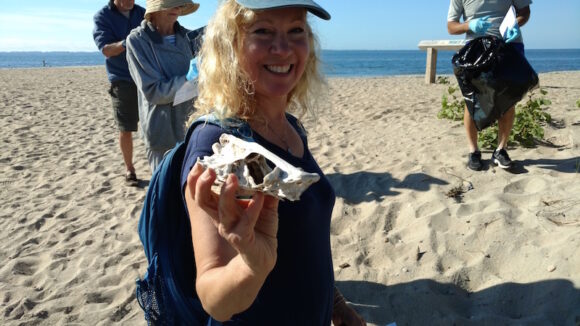
Save the Sound, a bi-state program of Connecticut Fund for the environment, organized 31 cleanups across Connecticut’s shoreline this weekend. The efforts are part of International Coastal Cleanup, which brings together hundreds of thousands of people each year to remove plastic bags, broken glass, cigarette butts, and other trash from the world’s shores and waterways. One of the areas included in the cleanup effort was from White Sand Beach to the tip of Griswold Point in Old Lyme.
The event was founded by Ocean Conservancy in 1985, and Save the Sound has served as the official Connecticut coordinator for the last 14 years.
 “We didn’t plan it this way, but I can’t imagine a better way to celebrate the 31st anniversary of International Coastal Cleanup Day than with 31 cleanups!” said Chris Cryder, special projects coordinator for Save the Sound. “The cleanup just keeps growing, in Connecticut and worldwide. We have some terrific new and returning partners this year, including the SECONN Divers, folks from the U.S. District Court, multiple National Charity League chapters, and many more.”
“We didn’t plan it this way, but I can’t imagine a better way to celebrate the 31st anniversary of International Coastal Cleanup Day than with 31 cleanups!” said Chris Cryder, special projects coordinator for Save the Sound. “The cleanup just keeps growing, in Connecticut and worldwide. We have some terrific new and returning partners this year, including the SECONN Divers, folks from the U.S. District Court, multiple National Charity League chapters, and many more.”
Cryder continued, “The diversity of the groups involved really reflects the truth that ocean health affects all of us. Clean beaches and oceans are safer for beachgoers and boaters, they’re healthier for wildlife that aren’t eating plastic or getting tangled up in trash, and they’re economic powerhouses for the fishing and tourism industries.”
The cleanups are co-hosted by a wide array of local partners including high schools, youth groups, and scout troops; churches; boaters and divers; watershed associations, park stewards, and land trusts. Twenty-eight cleanups will be held Saturday, with three more on Sunday and others through mid-October, for a total of 70 cleanups statewide.
Based on the estimates of cleanup captains, between 750 and 900 volunteers were expected to pitch in on Saturday alone. Last year, a total of 1,512 volunteers participated in Save the Sound cleanups throughout the fall. They collected more than three tons of litter and debris from 58 sites on Connecticut beaches, marshes, and riverbanks.
Over the event’s three-decade history, 11.5 million volunteers have collected 210 million pounds of trash worldwide. Every piece of trash volunteers find is tracked, reported to Save the Sound, and included in Ocean Conservancy’s annual index of global marine debris. The data is used to track trends in litter and devise policies to stop it at its source.